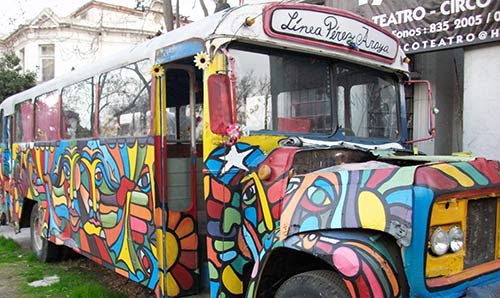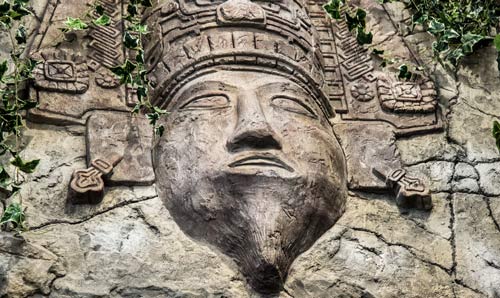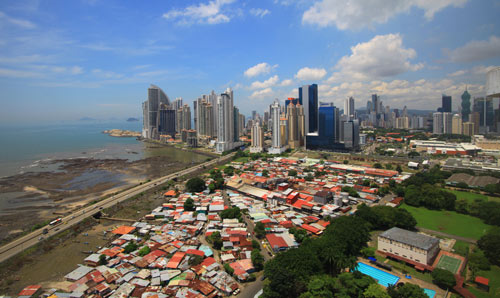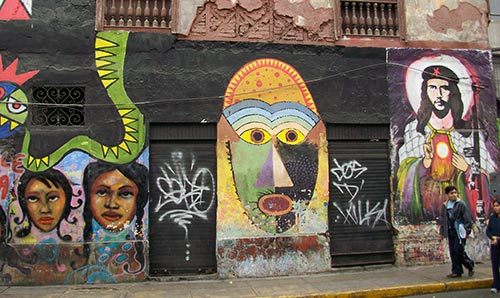Our research
The Centre's current research focuses broadly on the problem of global inequalities, one of the University’s research beacons.
Specifically our work is organised around the following four areas.
Mobilities

Tackling the relationship between movement – both forced and self-determined – and identity, research in this strand addresses migration, immigration and exile. Researchers look both at highly localized manifestations of movement, as well as how such mobilities are located within regional, transnational and global structures.
Culture and power

Research in this area focuses on the varying ways that culture can challenge imposed economic hierarchies, political identities and social relations in the region. The historically charged and contested nature of culture informs research in this area, which includes not only cultural production and the politics of representation but also cultural politics, habits, ethics and histories.
Urban inequalities

Latin America is the world’s most urbanised region and its cities have some of the starkest wealth divides. But our research highlights that such urban conglomerations also house immense potential for mobilising alternative urban futures via informal building practices and architectures, political and economic self-determination, and cultural resistance. Our work in this area contributes to research undertaken within The Manchester Urban Institute.
Racial and ethnic identities

Drawing on the racial, ethnic and cultural hybridity, mestizaje and transculturation that lie at the heart of the Latin America and the Caribbean, research in this strand tackles the historical and contemporary social inequalities that coalesce around race and ethnicity.
Regional specialisms
Mexico and Central America
Francisco Eissa Barroso, Lúcia Sá
Brazil
Karl Posso, Lúcia Sá, Angela Torresán, Chloe Nahum-Claudel, Nuno Pinto, Karen Lucas
The Caribbean
Natalie Zacek, Nicolle Alzamora
Colombia, Venezuela and Ecuador
Peter Wade, Francisco Eissa Barroso, Ignacio Aguiló, Nuno Pinto, Karen Lucas
The Andes
Ignacio Aguiló, Tanja Bastia, Francisco Eissa Barroso, Valentino Gianuzzi, James Scorer
The Southern Cone
Ignacio Aguiló, Tanja Bastia, Karl Posso, James Scorer, Carlo Edoardo Altamura, Karen Lucas
Postgraduate study
The diversity of interests of academics and postgraduate students affiliated with the Centre means that we can offer one of the richest and most vibrant environments for studying the region in the UK.
Studying for a doctoral degree in Latin American and Caribbean Studies at the University of Manchester gives you the opportunity to work with people who are producing innovative and thought-provoking research.
- Our members' research interests
- Current and recent PhD students
- Postgraduate research: Humanities and Social Anthropology
Taught master’s degrees
Suggested courses at Manchester include:
- A master's in Social Anthropology
- An MSc or MA with the Institute for Humanitarian and Conflict Response (HCRI)
- An MSc taught by the School of Environment, Education and Development - such a Global Urban Development and Planning or International Development
Research projects
The following list of recent and current projects gives an idea of the range of research carried out by Centre for Latin American and Caribbean Studies (CLACS) staff.
Indigenous Youth Cultures and New Media in Latin America
Principal Investigator: Dr Ignacio Aguiló
Manchester Advisor: Prof Peter Wade
Funder: AHRC
Period: Aug 23 - Apr 25
This project explores how people in Ecuador, Argentina, and Chile who identify as young and Kichwa and Mapuche use social media to articulate new forms of activism that differ from previous Indigenous political engagement. It includes collaborations with academics from Ecuador, Argentina, Switzerland, and the United Kingdom and Indigenous activists, artists and performers, with whom we will organise public events in Otavalo (Ecuador), Bariloche (Argentina), and Manchester (United Kingdom).
Comics and Race in Latin America
Principal Investigator: Dr James Scorer
Manchester Co-Investigator: Prof Peter Wade
Funder: AHRC
Period: Mar 21 - Mar 24
This project explores the relationship between comics and race in Latin America. As comics use visual shorthands to communicate complex cultural histories quickly, they are susceptible to simplistic, stereotypical representations of cultural difference. But comics artists in Latin America have also produced more considered explorations of race, sometimes constructing anti-racist discourses.
The relationship between comics and race demands attention not only because of the region’s long-standing racial hierarchies and tensions but also because Latin America is currently undergoing a comics renaissance. There are now more independent publishers dedicated to comics, more comics festivals, greater circulation of both print and digital comics, and a growing number of artists whose work is gaining international recognition.
The project will unpack how Latin American comics in the region have treated issues of blackness and indigeneity from the nineteenth century to the present in three different countries - Argentina, Colombia and Peru. And it will analyse how the comics world, which remains predominantly white, might seek out ways to be less inscribed by racial inequalities by thinking about how race inflects the work and working practices of contemporary comics artists in these countries and beyond.
Trajectories of Reform in the Spanish World: Careering, Networks and Empire under the Early Bourbons (1700-1759)
Principal Investigator: Dr Francisco Eissa-Barroso
Funder: AHRC
Period: Feb 20 - Dec 22
This project explores how early modern empires were built through the experiences, relationships and careers of individuals whose lives were spent in multiple sites of empire. It challenges our tendency to study 'composite monarchies' as sets of bilateral relations between a dominant centre and multiple peripheries, highlighting both the dialogic nature of these relations and the importance of periphery-periphery connections and interactions. Its main aim is to study how ideas, institutions and social structures often associated with the 'centralising absolutism' of the early-Bourbon monarchy in Spain were influenced by travel to and contact with different sites of empire across the Spanish world. By analysing the careers, networks and writings of royal officials involved in the design or implementation of reform in the Iberian Peninsula, the Spanish Circum-Caribbean and the Andean highlands, the project will show that experiencing various sites of empire shaped their understanding of the constituent territories of the monarchy, their views of the empire as a whole, opinions of what needed to be reformed, and of how such reforms should be introduced. Simultaneously, by studying their careers and the familial and patron-client networks they built, the project will contribute to our understanding of how different parts of the Spanish world contributed to the formation and transformation of institutions and personnel associated with imperial reform, thus further problematizing our understanding of the relationship between sites traditionally described as centres and peripheries.
Cultures of Anti-Racism in Latin America
Principal Investigator: Prof Peter Wade
Manchester Co-Investigators: Prof Lúcia Sá and Dr Ignacio Aguiló
Funder: AHRC
Period: Jan 20 - Jan 23
In a global context of persistent racism and racial inequality, alongside the growing "post-racial" denial of their importance, this project will explore the role of the arts in challenging racism. The project aims to investigate the sociality, practices and discourses of contemporary cultural producers working in literature and visual and performing arts who focus on issues of racial difference, racism and anti-racism in three Latin American contexts: Brazil, Colombia and Argentina. We work on the basis that the arts have always played a crucial role in anti-racist movements, serving as important tools with which to protest against and educate about racism. The arts have the ability to mobilise emotions through narrative and performance, and this makes them well suited to deal with racism's dependence on an emotive logic.
A notable feature of the project is that it encompasses anti-black and anti-indigenous racism in a region where practices and attitudes prejudicial to indigenous people are often not labelled as racism, but also at a time at which this label is becoming increasingly popular in struggles against such prejudice, highlighting the structural dimensions of indigenous disadvantage. A further strength of the project is its comparative approach, which seeks to use the rather different racial formations of Argentina, Brazil and Colombia to assess how generic or country-specific anti-racism strategies are.
More information: https://gtr.ukri.org/projects?ref=AH%2FS004823%2F1
Latin American Anti-Racism in a 'Post-Racial' Age - LAPORA
Principal Investigators: Prof Peter Wade and Dr Mónica Moreno Figueroa (The University of Cambridge)
Funder: ESRC
Period: Jan 17 - Nov 19
This project investigates anti-racist practices and ideologies in Ecuador, Brazil, Colombia and Mexico. The project contributes to addressing problems of racism and racial inequality in the region and to shaping on-going debates there about how to conceptualise and label racism, anti-racism, discrimination and the idea of race.
Latin American countries present new opportunities for thinking about anti-racism and the role of race at a time when many claim that, at least in Europe and the United States, we have entered a ‘post-racial’ world, where anti-racism has apparently gone into ‘crisis’ and emerged as an often insipid and hard-to-defend multiculturalism.
We propose that the situation in Latin America will help to interrogate the concept of anti-racism and its cross-cultural applicability and diversity, and provide lessons of wider relevance to anti-racism generally: how should anti-racism be conceptualised, as part of a social justice agenda, when racial differences are blurred by race mixture and merge into cultural difference, and when victim and victimiser can be the same person?
More information: https://www.lapora.sociology.cam.ac.uk/
Racism and Anti-Racism in Brazil: The Case of Indigenous Peoples
Principal Investigator: Prof Lúcia Sá
Funder: AHRC
Period: Nov 17 - Oct 19
The purpose of this Research Network is to organise three events that will bring together indigenous leaders, artists and intellectuals with academics from the Humanities and Social Sciences with a view to discuss the current rise in racism and violence against indigenous peoples in Brazil, as well as strategies to resist it and contain it.
More information: https://gtr.ukri.org/projects?ref=AH%2FR004374%2F1
Comics and the Latin American City: Framing Urban Communities
Principal Investigator: Dr James Scorer
Period: Nov 16 - Oct 19
Funder: The Leverhulme Trust
More information: https://comicsandthelatinamericancity.wordpress.com/about/
This International Network looks at the way comics represent and shape urban life in Latin America. Specifically, it will focus on how Latin American cities appear in graphic fiction; how comics are used within the cityscape; and how comics, in the shape of websites, fanzines and festivals, provide a site around which urban communities coalesce.
Useful links
Below are some links for further information you may find useful whilst studying Latin American Cultural Studies.
At Manchester
Latin American Cultural Studies
- Duke Graduate Certificate in Latin American Cultural Studies
- Journal of Latin American Cultural Studies
- Nepantla: Views from South
- Punto de vista
- Revista de crítica cultural
- Biblioteca Virtual de Estudos Culturais
- Forced Migration Review
Latin American Studies
- Institute for the Studies of the Americas, London
- Centre of Latin American Studies, Cambridge
- Centre for Latin American Studies, Essex
- University of Texas, Latin American Centre
- Latin American Studies Association (LASA)
- Society for Latin American Studies (SLAS)
- Association of Hispanists of Great Britain and Ireland
- North American Congress on Latin America (NACLA)
Latin American Culture
- ArtNexus Magazine, Latin American Art
- University of Essex Collection of Latin American Art
Partner institutions
- Pensar: Instituto de Estudios Sociales y Culturales Pontificia Universidad Javeriana, Bogotá, Colombia
